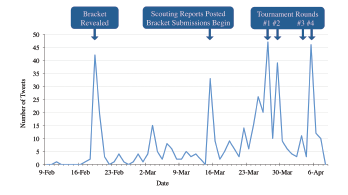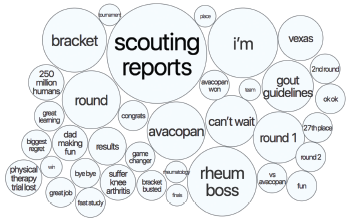
Figure 2: Tweet About It
This figure shows the number of tweets per day using the hashtag #RheumMadness during the 2021 tournament. Data from Symplur.
impressions, or the number of times a tweet about #RheumMadness appears in any Twitter user’s feed. In 2021, RheumMadness led to 2,312,386 potential Twitter impressions (data from Symplur, 2/8/21–4/8/21).
What do RheumMadness participants tweet about? Participants share their perspectives on concepts in the tournament, joke and connect with each other, rejoice when their bracket performs well, and commiserate when their bracket performs poorly.
Particularly memorable moments from the 2021 tournament included rheumatology participants educating a nephrologist about the importance of the newly identified and described VEXAS syndrome, authors of studies included in the tournament chiming in with their own insights, and a Twitter poll created by a participant asking rheumatologists if the black box warning for febuxostat should be modified or removed based on the findings of the Febuxostat versus Allopurinol Streamlined Trial (FAST). A word cloud of trending terms from Twitter conversations during the tournament provides a glimpse into the social interactions in RheumMadness (see Figure 3).

Figure 3: Trending Terms
This word cloud illustrates the terms that trended on Twitter during the RheumMadness 2021 tournament, excluding tweets from @DavidLeverenz (tournament organizer) and all retweets. Data from Symplur.
We also created a private RheumMadness Facebook group just for rheumatology trainees, hypothesizing that trainees might feel more comfortable sharing their thoughts and opinions with peers in a private space, rather than broadly on Twitter. Although we did garner 81 members in the Facebook group, there was surprisingly little interaction on Facebook compared with Twitter. Therefore, moving forward, Twitter will continue to serve as the main social space for connection in RheumMadness.
With the knowledge that podcasts help foster a sense of connection in professional communities, we created a RheumMadness podcast series, hosted by the RheumMadness Leadership Team, all of whom are authors of this article.5 The composition of this team is intended to reflect the target audience for RheumMadness, ranging from fully trained rheumatologists to those aspiring to become rheumatologists.
Listeners are invited to journey with us through each stage of RheumMadness. In our first episodes, we discussed teams that could be included in the bracket to familiarize listeners with the concept of rheumatology topics playing as teams in the tournament while also providing direct teaching about the topics.
After announcing the 2021 bracket of teams, we recorded two bracketology episodes, discussing how each team might do in the tournament, thus providing context for the type of conversation we hoped RheumMadness might foster online.
In our final two episodes, we reflected on the results of the tournament and thanked everyone involved. In total, we recorded 15 podcast episodes from August 2020 through April 2021, generating more than 2,300 total downloads, an average of 153 downloads per episode.



